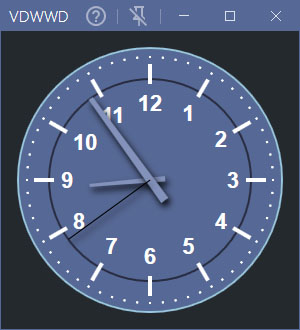Analog Clock in WPF

Create an analog clock in WPF with The Gauge Library from Arction.
The library is not open source but it is free, so no problems there.
Download the library from their site (by requesting a link per email) and add the Arction.WPF.Gauges.dll library to your project.
Then add the Gauge Control to a Window. (Don't forget to add the line xmlns:agc="http://www.arction.com/gauges/")
You can also download a WPF Analog Clock that has been styled as a stand-alone executable.
Download
Code Snippets
The clock XAML of the MainWindow.
<Window x:Class="ClockDemo.MainWindow"
xmlns="http://schemas.microsoft.com/winfx/2006/xaml/presentation"
xmlns:x="http://schemas.microsoft.com/winfx/2006/xaml"
xmlns:d="http://schemas.microsoft.com/expression/blend/2008"
xmlns:mc="http://schemas.openxmlformats.org/markup-compatibility/2006"
xmlns:agc="http://www.arction.com/gauges/"
xmlns:local="clr-namespace:ClockDemo"
mc:Ignorable="d" Height="370" Width="340"
Title="WPF Analog Clock Demo">
<Grid>
<agc:Gauge Name="Clock1"/>
</Grid>
</Window>
And the MainWindow C# code to make it all work.
using System;
using System.Timers;
using Arction.Gauges;
using Arction.Gauges.Dials;
using System.Windows;
using System.Windows.Controls;
namespace ClockDemo
{
public partial class MainWindow : Window
{
public MainWindow()
{
InitializeComponent();
//window title
this.Title = "WPF Clock Demo";
//create the clock
CreateClock();
//create the timer
var timer = new Timer()
{
Interval = 1000,
Enabled = true
};
timer.Elapsed += new ElapsedEventHandler(Timer_Tick);
}
private void CreateClock()
{
//some clock default stuff
Clock1.Width = 300;
Clock1.Height = 300;
//create the hour scales
var Hours = new Scale()
{
AngleBegin = 60,
AngleEnd = 60,
DialLengthFactor = 0.6,
DialShape = DialShape.DefaultNeedle,
Label = new TextBlock(),
MajorTickCount = 12,
MinorTickCount = 0,
RangeBegin = 1,
RangeEnd = 13,
ValueIndicatorDistance = -1000
};
//create the minute scales
var Minutes = new Scale()
{
AngleBegin = 90,
AngleEnd = 90,
DialLengthFactor = 0.8,
DialShape = DialShape.DefaultNeedle,
MajorTickCount = 60,
MinorTickCount = 0,
RangeBegin = 0,
RangeEnd = 60,
MajorTicks = new MajorTicksLine()
{
LabelsEnabled = false
}
};
//create the second scales
var Seconds = new Scale()
{
AngleBegin = 90,
AngleEnd = 90,
DialLengthFactor = 0.8,
DialShape = DialShape.Line,
MajorTickCount = 60,
MinorTickCount = 0,
RangeBegin = 0,
RangeEnd = 60,
MajorTicks = new MajorTicksLine()
{
LabelsEnabled = false
}
};
//add the scales to the clock
Clock1.PrimaryScale = Hours;
Clock1.SecondaryScales.Add(Minutes);
Clock1.SecondaryScales.Add(Seconds);
//set the current time
Timer_Tick(null, null);
}
private void Timer_Tick(object sender, ElapsedEventArgs e)
{
this.Dispatcher.Invoke(() =>
{
DateTime time = new DateTime();
Clock1.PrimaryScale.Value = time.Hour;
Clock1.SecondaryScales[0].Value = time.Minute;
Clock1.SecondaryScales[1].Value = time.Second;
});
}
}
}